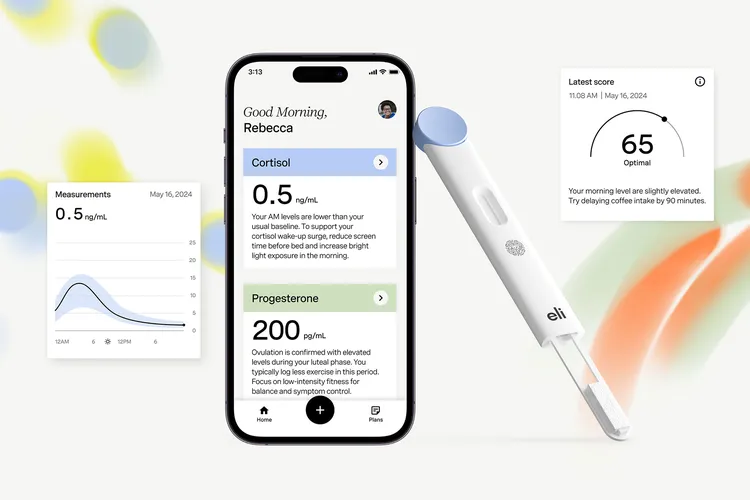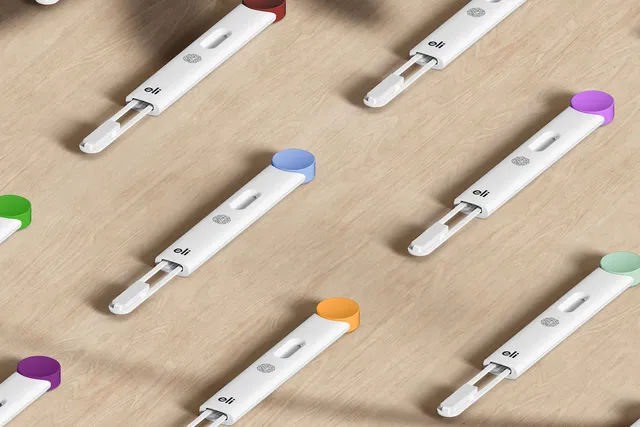The Hormometer is an at-home test that lets you measure cortisol and progesterone levels.
If you’re a health enthusiast, you’ve probably noticed the growing buzz around hormone balancing. Social media influencers have championed it as a game-changer for everything from weight loss to stress reduction and even managing symptoms of conditions like polycystic ovary syndrome (PCOS). Enter Eli Health’s groundbreaking innovation: Hormometer—an at-home hormone-testing device that uses your saliva and smartphone camera to give you real-time insights into your hormone levels.
Hormometer isn’t just another wellness gadget; it’s a reflection of where health tech is headed. Here’s everything you need to know about this innovative system and why it’s making waves in the wellness world.
How Does Hormometer Work?
At its core, Hormometer simplifies hormone testing with a user-friendly, saliva-based system. The device itself is a slim, cartridge-like stick—resembling a pregnancy test—that you place in your mouth for 60 seconds to collect a saliva sample. Once the sample is ready, the accompanying Eli app takes over. Using your smartphone’s camera, the app analyzes the test results by assessing color intensity and sample patterns. Within moments, it delivers personalized insights into your hormone trends, offering actionable recommendations related to stress, sleep, athletic performance, and fertility.
What Hormones Can It Test?
Hormometer currently supports two key hormone tests: cortisol and progesterone.
- Cortisol: Known as the “stress hormone,” cortisol regulates critical bodily functions such as the fight-or-flight response, blood pressure, metabolism, and sleep cycles. Imbalances in cortisol levels can lead to serious health issues, including fatigue, unintentional weight changes, Type 2 diabetes, and abnormal blood pressure.
- Progesterone: A vital reproductive hormone, progesterone plays a significant role in menstrual cycles, pregnancy, and overall reproductive health. Abnormal levels of this hormone are linked to irregular periods, fertility challenges, and even mood disorders like depression.

Why Hormometer Is a Game-Changer
Traditional hormone testing is often inconvenient, involving blood draws or urine samples that need to be sent to a lab. Results can take days or weeks, and the process often requires a doctor’s visit. Hormometer eliminates these hurdles with its non-invasive, saliva-based system that provides results almost instantly. It’s portable, mess-free, and doesn’t rely on third-party labs—making it an ideal solution for people with busy lifestyles.
What truly sets Hormometer apart is its affordability. Eli Health offers a subscription plan starting at just $8 per month with a 12-month commitment. Compared to traditional at-home hormone tests, which range from $30 to $250 and often require mailing in samples, Hormometer’s pricing is refreshingly competitive.
The Rise of At-Home Health Testing
At-home health testing kits surged in popularity during the COVID-19 pandemic, and the trend hasn’t slowed down. From DNA testing to at-home PCR kits, consumers have embraced the convenience and empowerment that comes with managing their health on their own terms. Hormometer builds on this momentum, addressing the rising demand for quick, accessible hormone testing—a market largely driven by the wellness community’s focus on stress management and fertility tracking.
Debunking the “Hormone Balancing” Myth
It’s important to address the elephant in the room: the idea of “balancing hormones.” While social media is rife with tips to fix “cortisol face” or boost hormonal health, medical experts caution against oversimplified claims. Hormones are inherently dynamic and fluctuate throughout the day; they can’t truly be “balanced.” That said, tools like Hormometer can provide valuable insights for individuals diagnosed with chronic hormonal or reproductive health issues, enabling them to better monitor their conditions and make informed decisions.
How Accurate Is Hormometer?
Accuracy is a critical factor for any health device, and Eli Health is transparent about where Hormometer stands. The device is FDA-registered, which means it complies with safety standards, but it hasn’t yet received FDA clearance or approval. This distinction is important, as FDA registration does not imply the agency has independently verified the company’s claims.
That said, Eli Health’s internal testing shows promising results. According to the company, Hormometer’s cortisol test has a 97% agreement with gold-standard, FDA-approved lab tests, while the progesterone test shows a 94% agreement. These figures suggest that Hormometer’s results are highly reliable, though independent validation will be key to its long-term success.
What’s Next for Hormometer?
Eli Health has ambitious plans for Hormometer. The device is set to enter beta access this month in the United States and Canada, with a full launch expected later this year. While its current capabilities are limited to cortisol and progesterone, the company is already developing additional tests for hormones like testosterone and estradiol. This expansion could make Hormometer a comprehensive tool for monitoring various aspects of hormonal health.
The Bottom Line
Hormometer represents a significant step forward in personalized health care, offering an accessible and affordable way to track hormone levels from the comfort of your home. While it’s not a replacement for professional medical advice, it’s a powerful tool for those looking to better understand their bodies and make data-driven lifestyle changes. Whether you’re managing a hormonal condition, tracking fertility, or simply curious about your stress levels, Hormometer could be a game-changer for your wellness journey.
As the wellness industry continues to evolve, tools like Hormometer highlight the potential of technology to make health care more convenient and personalized. With its innovative approach and commitment to accessibility, Hormometer is poised to become a staple in the world of at-home health testing.










